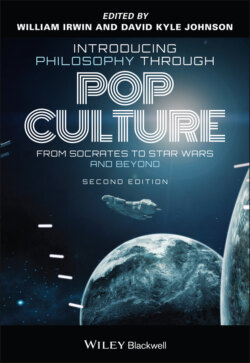Читать книгу Introducing Philosophy Through Pop Culture - Группа авторов - Страница 23
Summary
ОглавлениеThe creators of South Park are aware of logical principles and purposely violate them to show the absurdities associated with certain beliefs, opinions, ideas, and arguments. In fact, much of South Park's humor concerns logical violations and the contradictions and problems that result. Logic is the study of the principles of correct reasoning associated with the formation and analysis of arguments. Using examples from South Park, this chapter offers a short logic lesson as an introduction to what philosophers do when they put forward and critique arguments. Topics covered include the parts of an argument (premise and conclusion), premise‐ and conclusion‐indicating words, deductive versus inductive arguments, good versus bad arguments, and a few common fallacies such as the famous Chewbacca defense utilized by the cartoon Johnny Cochran in the episode “Chef Aid.”
The Goth kids on South Park crack me up because they remind me of the Goths at the high school where I taught in the early 1990s, sitting around all looking like the bastard children of Robert Smith from The Cure and an 80s‐ish Tori Amos. In fact, my first reaction to seeing a group of kids dressed like that at a mall is automatically to think, “They're all saturnine, shady, surly, and, of course, suspect.” Alliteration aside, that conclusion is unfair, isn't it? It's an example of the fallacy of hasty generalization, actually. A fallacy occurs when we inappropriately or incorrectly draw a conclusion from reasons that do not support the conclusion, and hasty generalization is a common fallacy often lampooned on South Park. In a hasty generalization, a person fallaciously draws a conclusion about characteristics of a whole group based upon premises concerning characteristics of a small sample of the group. Most times, when we think to ourselves “they're all like that” in talking about anything – cars, movies, Goths – based upon a small sample of the group we're talking about, we commit a hasty generalization. There is usually no way definitely to conclude something about the characteristics of an entire group since we have no knowledge of the entire group. The next member of the group we encounter may turn out to have different characteristics from members of the group we know thus far. In fact, many of those little Goths at the high school where I taught were not at all saturnine, shady, or surly once you chatted with them, and I was reasoning fallaciously by immediately jumping to that conclusion.
Any form of prejudice and stereotyping, by definition, constitutes a hasty generalization.
Consider the way Kyle's Jewish cousin, Kyle 2, is stereotyped in “The Entity,” or how Mexicans are type‐cast as lazy, gay people are all flamboyant like Big Gay Al or Mr. Slave, and African Americans are reverse type‐cast as “richers” in “Here Comes the Neighborhood.” Even Officer Barbrady commits the fallacy of hasty generalization in “Chickenlover” when, after reading a copy of Ayn Rand's Atlas Shrugged, he concludes that all books must be this bad, and reading “totally sucks ass.” The creators of South Park play on people's hasty generalizations to make their points in episode after episode, probably because not only is prejudice something that morally harms people, but it also logically “harms” people's thinking as well.
This chapter offers a short logic lesson as an introduction to what philosophers and other critical thinkers do when they put forward and critique arguments. Logic is the study of the principles of correct reasoning associated with the formation and analysis of arguments.1 The creators of South Park, for the most part, are aware of these logical principles, and purposely violate them to show the absurdities associated with certain beliefs, opinions, ideas, and arguments. In fact, much of South Park's humor concerns logical violations and the absurdities, contradictions, and problems that result. The way people reason correctly, or incorrectly, has real consequences. It affects the policies they adhere to, the laws they make, the beliefs they are willing to die for, and the general way in which they live their lives.
For example, in the episode “Death” because of Mrs. Broflovski and the town's belief that the Terrance and Phillip Show promotes immorality, the entire community not only boycotts the show, but also sacrifices members of the community to get the producers of the show to take it off the air. This fictional morality tale parallels parts of reality, and raises questions as to whether TV promotes immorality, as well as what people are willing to do based upon their perceived connection between TV and immorality. Can we draw the general conclusion that a show like South Park, even if viewed by children, is bad for all children, from evidence that supports the fact that it is bad for some children? Further, even if it does promote immorality, is that the kind of thing we are willing to die for? This may seem like a silly question, but the actions of the South Park townspeople get us to think about what kinds of things people are willing to believe or do based upon their faulty reasoning.
Consider a somewhat parallel case. Are all Americans immoral? And even if so, should we sacrifice people so as to make our point about them being immoral by flying planes into a skyscraper? Again, how we live our lives, as well as how we affect others' lives, depends upon whether we reason correctly or incorrectly. (You, the reader, may even find what I have said in this paragraph to be logically questionable). In what follows, we'll consider some basics of logic and, using examples from South Park episodes, show some differences between correct and incorrect reasoning.
